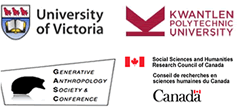Welcome
The 2014 conference continues a series of such events dating back to 2007, when the inaugural “Generative Anthropology Thinking Event” was held at the University of British Columbia in Vancouver. The success of this event led to further activities, including (but not limited to) the following:
- international conferences in Ottawa (2009), Tokyo (2012), and Los Angeles (2013)
- the creation of the Generative Anthropology Society and Conference (2010)
- a vigorous outreach program spearheaded by the open access journal Anthropoetics
- the publication of nine books developing the central hypotheses of Generative Anthropology
Now in its eighth year, the Generative Anthropology Summer Conference returns to the West Coast of Canada where we aim to build on the success of these previous activities.
Call for Papers
Our conference theme is deferral, discipline, knowledge. Critical objectivity and self-reflection are necessary for innovation and renewal across the disciplines. Yet only in the humanities does the idea of self-reflection coincide with the origin of one’s disciplinary object. Humanists study texts, and the text is structured by the differentiation and deferral of symbolic signs, a process Jacques Derrida, in his early seminal work, attempted to analyze under the rubric of a “grammatology.”
Deferral is also where deconstruction overlaps with Eric Gans’s originary hypothesis, which views representation as the deferral of violence, and the first symbolic sign as an aborted gesture of appropriation. Deferral, meanwhile, is the basis of any discipline, whether by discipline we mean a shared object and vocabulary of inquiry, or a mode of self- or other-regulation.
We are seeking papers that examine the general theme of deferral and discipline within the context of human knowledge, knowledge-making, and knowledge-events, thereby focusing on the task of theory, the role of the academy, and the responsibilities of pedagogy.
We will consider as many dimensions as possible, including but not limited to:
- deferral in moral and ethical theory
- esthetic deferral; the deferral of desire in literature and the arts
- the relation between deferral and difference
- disciplines and disciplinarity
- the history and sociology of discipline
- Generative Anthropology and its relation to other disciplines
- Eric Gans’s thinking and that of leading postmodern thinkers of deferral and discipline, such as Agamben, Badiou, Bauman, Bourdieu, Butler, Derrida, Foucault, Habermas, Hacking, Heidegger, Kristeva, Kuhn, Lacan, Luhmann, Nussbaum, Sloterdijk, Spivak, Zizek and others
We welcome papers from those familiar with Generative Anthropology (GA) as well as those new to it; those friendly to GA as well as those critical of it.
We would especially welcome papers which explore, expand, question, re-situate or refute Gans’s claim that “representation is the deferral of violence,” and the consequent claim that this understanding of representation is the proper basis for humanistic knowledge and inquiry.
Proposals for papers of 20 minutes should be sent by email attachment to Richard van Oort, Department of English, University of Victoria.
Deadline: March 1
Brief GA bibliography, plus selected works by Raymond Tallis
Printable 8.5x11 poster (two pages, includes cfp)
Printable 11x17 poster (one page, does not include cfp)
Gans poster (8.5x14)
Tallis poster (8.5x14)
GASC Student Award
Students who wish to be considered for the GASC Student Award (includes $400 cash plus a registration fee waiver) must send their completed papers by February 1 to the above email address. Please state that you are applying for the award.


